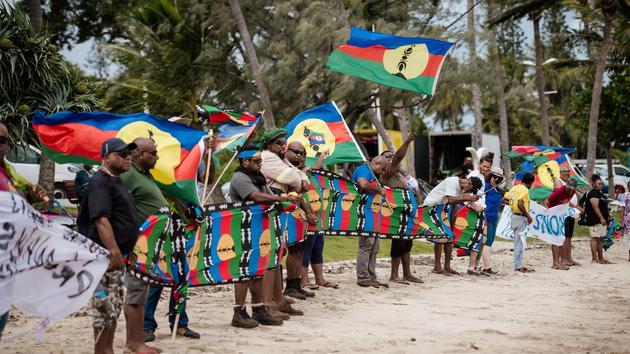A political crisis is now added to the economic crisis.
By bringing down the government of New Caledonia on Tuesday, the separatists plunged into institutional uncertainty an archipelago spared by the Covid-19 epidemic, but concerned about the threats weighing on its nickel sector, its economic lung.
Tensions around the future of the large factory in the South have been parasitizing local political life for several months.
By resigning en bloc from the local executive led by their loyalist opponents, the separatists hoped to slow down the sale of the nickel site managed by the Brazilian Vale, before February 12 - the deadline for its sale to a Caledonian and international consortium in which appears the Swiss giant Trafigura.
Plagued by violence committed in December by radical separatists, anxious to see
"Caledonian interests" take
precedence over
"the interests of multinationals"
, the factory is at a standstill, with 3,000 direct and indirect jobs at stake. to the dismay of the pro-independence, who were counting on their resignation to prevent this green light, the Mining Council gave a favorable opinion on Friday to the change of control of the site, backed by the rich Goro deposit.
In the French community, governed by a large degree of autonomy, local political forces are now active in view of February 17, the day of the election of a new government and its president by Congress, the legislative body of the Isle.
The poll promises to be tense, while the process of decolonization of the archipelago, opened by the Matignon agreements in 1988 and extended ten years later by the Nouméa agreement, is due to end in 2022.
To read also:
New Caledonia: how to explain the independence push?
One year away from a third and final self-determination referendum, decisive for the future of the island, the separatists could win the presidency of the local government for the first time.
In this sense, they are counting on the abstention or the support of a pivotal party, the Oceanic Awakening, at the origin of alliances with variable geometry - support of the separatists in Congress, of the loyalists in the Southern Province and of the head of the outgoing government.
"A work-study program would allow a new team to come out of the difficulties from the top, while respecting the rights of the local populations",
judges the independence president of the Congress, Roch Wamytan.
"It would be a denial of democracy, because the majority of the inhabitants are against independence",
warns the leader of the right, Avenir en Confidence, in Congress, Valérie Ruffenach.
During the previous referendum, on October 4, voters chose France at 53.3%.
From Paris, the French executive is trying for its part to relaunch a stalled transpartisan dialogue by calling on the Caledonian political class to
"continue"
the
"discussions"
with a view to the next referendum.
To
"enrich the political dialogue",
a consultation of civil society on the institutional future of the archipelago was launched in January by the government.
New committee
Once again in this case, the state is at the center of attention.
According to our information, figures from the non-independence camp are preparing to ask Jean Castex, by mail, to convene a new committee of signatories to the Nouméa agreement - the transpartisan body responsible for monitoring the application of the agreement has not met since October 2019.
Objective: to appease a divided Caledonian society.
"I am really worried, the separatists are overwhelmed by their base, and our supporters are very upset too,"
said the president of the southern province, Sonia Backès, one of the signatories of the letter to the Prime Minister.
Close to Senator Les Républicains (LR) Paul Frogier, the president (ex-LR) of Hauts-de-France, Xavier Bertrand, for his part asked Jean Castex, Wednesday, in a letter, to
"take an initiative of nature to lower the tension ”
in the archipelago.

